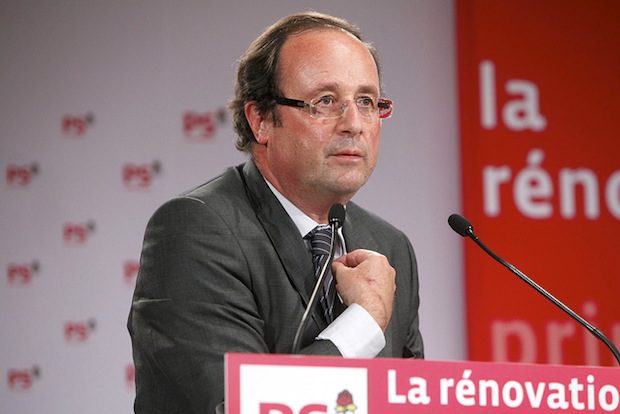France Needs the Mistral Deal More Than Russia

France officially reneged on its sale of Mistral-class amphibious assault ships to Russia last week. This was not surprising, but it was a long time coming: a number of NATO members had been pressuring France to take this step since the beginning of the Ukrainian crisis in February.
French President François Hollande resisted cancelling the deal after the overthrow of Viktor Yanukovych, resisted after the annexation of Crimea by Russia, resisted after the start of the rebellion in the Donbass, and resisted after the downing of Malaysia Airlines flight MH17. But the confluence of the release of explicit evidence of Russia’s involvement in the separatist rebellion and the start of the NATO summit in Wales appears to have been too much. Hollande’s hand was forced.
But why did Hollande resist for so long? Lest anyone think otherwise, it was certainly not for strategic reasons.
François Hollande is one of the most unpopular leaders the Élysée Palace has ever seen. He came into office with a socialist platform of combating former President Sarkozy’s austerity and fighting Germany’s strict policy of fiscal restraint in Europe. Yet this he did not do—because it was not within his power. France itself has a deficit and debt problem and cannot therefore afford expansionist EU monetary policies. Hollande not being the most charismatic of leaders, coupled with his failure to produce an alternative to austerity, has cost him the support of French citizens left and right.
His determination to retain the Mistral contract with Russia, far from being motivated by some form of strategic statesmanship, was an attempt to ingratiate himself with a traditionally left-wing electorate: workers in the shipping industry. But this too has apparently failed, and now the question is who will foot the 1.2 billion euros ($1.6 billion) bill for the ships. Add crews, helicopters, and maintenance, and the total burden of being stuck with the ships will rise two- or threefold.
This has undercut the possibility of NATO or the EU purchasing the ships from France and putting them to “collective use,” as has the fact that NATO does not have any shortage of amphibious assault ships to begin with—the UK, France, Italy, Spain, and the U.S. have plenty—and the states most likely to operate such vessels are all strapped for cash and coming out of severe economic crises.
So how does the suspended sale affect Russia, the object of NATO’s concerns?
This is certainly not good news for Russia since the strengthening of its amphibious military capability has been postponed for years. Russia inherited a number of amphibious forces from the USSR, but these are old, and the Soviets never really specialized in this area. Russia is first and foremost a continental power; its naval investments were mostly designed for interdiction of enemy assets rather than power projection. It was this handicap that led Moscow to look abroad for some aspects of its naval modernization program. The contract with France called for the construction of two Mistral-class ships in France and two more to be built in Russia with French expertise and technology.
Yet suspension of the deal can at best be called a nuisance for Russia. Its money will now have to be repaid in full by France, with interest; much of the technology sharing has already occurred; and Russia can easily team up with countries such as China or India to build its own model of amphibious warship, probably at a significantly lower price.
Who comes out ahead from France’s change of course?
NATO has the biggest, most powerful navy on the planet and is preparing to designate Russia as a competitor for the foreseeable future. What benefit two redundant ships will have when what NATO’s eastern European allies are seeking is land and aerial commitments is anyone’s guess.
For Hollande, this will solidify the alienation of France’s proletariat from the centrist parties. Marine le Pen has made great inroads with this electorate, and the Front National is publicly opposed to the government’s stance on Ukraine and confrontation with Russia.
The strategic benefits of scotching this deal with Russia are minimal, and the political costs are real. The episode is another illustration of how counterproductive NATO’s actions are becoming.
The current policy towards Russia is the fruit of two structural tendencies: short-term thinking in the West and Russophobia in central and eastern Europe.
Western democracies’ governments operate with about a four-year shelf life, and unpopular policies that would involve confronting the sentiments of the masses or the proclivities of liberal cosmopolitan elites simply cannot be fathomed. Because of this dynamic, NATO was enlarged to include the small and easy to integrate former members of the Warsaw Pact. As a result, NATO gained a severely Russophobic voting bloc which, coupled with short-termist ambivalence from the Atlantic powers, tilted the scales of public opinion and decision-makers in astrategic directions.
Also worthy of mention is the influence of elites with transnational values who see constructs like the EU or NATO not as instruments of national interest but as ends in themselves. In the days of the Cold War, France and other Alliance members would collaborate on defense against the USSR but pursue divergent foreign policies when it suited their interests. Since 1989, there has been a tendency to force foreign policies to harmonize, even when it makes little sense for them to do so.
There is still the possibility that France’s decision may turn out to be a postponement rather than a cancellation. Regardless, France and the West have definitively added to their list of woes. As with many European policies, the hot potato will be passed to the next generation.
Miguel Nunes Silva is an analyst for the geostrategy consultancy Wikistrat, a member of CIMSEC the Center for International Maritime Security, and lectures at the Portuguese Atlantic Youth Association.
Comments